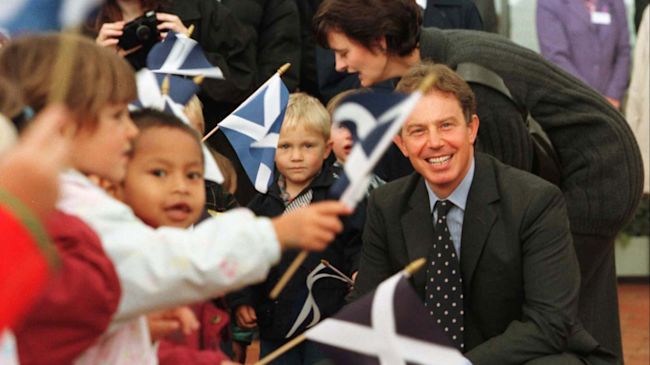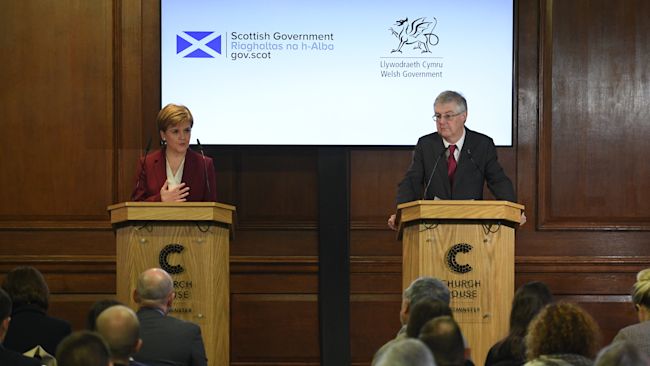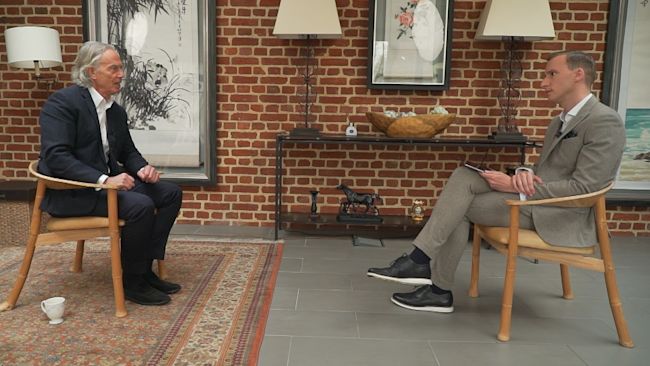Tony Blair admits 'weaknesses' of devolution failed to end calls for independence

Watch above: Tony Blair on devolution and calls for independence
I remember sitting on the school bus when the news came over the radio that my home nation had voted for devolution.
Whether you were for or against (and the numbers were almost equal), there was no denying that Wales was on a radical new path. But in what direction?
The Welsh and Scottish referendums of 1997 were supposed to heed the calls for greater autonomy and silence the drum beat of nationalism.
Later, Northern Ireland's peace process would deliver an assembly there, too. But more than 20 years on, demand to break away from the UK is running higher than ever across all three nations.
So, ahead of a crucial set of elections for the union next week, what does the architect of devolution make of his own work now?
Sitting down with Tony Blair, at first he is defensive.
"If the Labour Party hadn’t implemented its manifesto commitment to do devolution in 1997, the union would already be in tatters," he tells me.
But he admits his plan was not without fault.
"Where I think we were wrong was in believing that devolution would end the argument of independence - it hasn’t ended it... I agree it has proved to be a tougher fight than we anticipated."
Last year the current prime minister reportedly called devolution a "disaster". There are others who agree, arguing that it has only strengthened calls for independence, by demonstrating the ability of nations to go their own way.
During the pandemic, the profile of the devolved administrations has never been higher - daily press conferences have spelt out the separate policies like never before.
Mr Blair denies this has fuelled the fire of independence. Instead, he blames Brexit, and in Scotland, a lack of political opposition to the SNP.

But he admits that while his administration poured huge effort into creating governments, parliaments and assemblies, there was not enough focus on what would tie them together as one United Kingdom.
"I do think one of the weaknesses in the way we approached devolution was not to build real cultural ties and emphasise the enormous things that the different countries in the United Kingdom have in common."
That is something the current government is now attempting to correct, though not without controversy.
Mr Blair dismisses a recent policy to fly the union flag on government buildings as a "gimmick".
"I don't think that's the thing that's going to make the difference, its emphasising what we do have in common", he tells me.

Those are arguments unionists may have to deploy with more urgency than they'd like.
A majority for the SNP next week, or for an alliance of pro-independence parties, would provide fresh impetus for a second independence referendum.
Prime Minister Boris Johnson has said he will not grant one, potentially teeing up a constitutional crisis that may have to be resolved in the courts.
Despite the SNP spelling out their support for a second referendum in their manifesto, Mr Blair denies that a majority for Nicola Sturgeon automatically translates into a majority for another referendum.

"I'm not sure that even if the SNP win a majority in the Scottish Parliament that it necessarily means that people want to go through the disruption of an independence campaign - I would frankly doubt that."
He admits that it would become "more difficult over time" for PM Johnson to resist calls for another referendum, "if opinion looks as though it is fixed."
But he is pinning his hopes on a Labour rebirth in Scotland, which he says is under "exceptionally good" new leadership, even though it still trails behind the SNP in the polls. I asked Mr Blair if the UK will still exist in ten or 20 years' time. Yes, he insisted.
But that will require quite a revival in the fortunes of unionists like him and in the United Kingdom they hold dear.


0 Comments